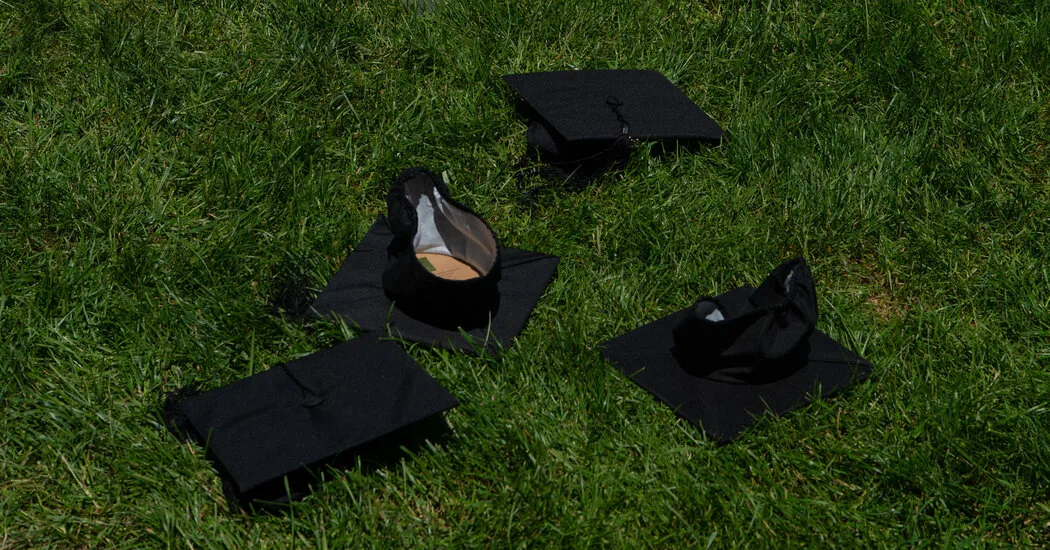
Would you consider pursuing a degree in a field you love even if it wouldn’t necessarily lead to a well-paying job?
If you are planning to go to college, what are you thinking of studying? Why?
Will your passion guide you, or are you more likely to choose a subject because it is practical and likely to lead to a job?
In the Opinion essay “Stop Corporatizing My Students,” the creative writing professor Beth Ann Fennelly writes about a proposal in her state, Mississippi, to determine which college majors are the most needed and least needed based on how likely students are to find employment in the state after graduation. Such a study could lead to changes in the way the state government allocates funding to public universities and community colleges.
The essay begins:
I have taught creative writing at Mississippi’s flagship university for over 20 years, and I’ve witnessed a powerful outcome: Students who master written and spoken communication can change the world.
Which is why the educational trend focusing on student outcomes is so alarming. In September, Mississippi’s state auditor, Shad White, published a report, “Plugging the Brain Drain: Investing in College Majors That Actually Work.” It notes that many students are likely to leave our state after completing their educations, presumably for more exciting opportunities elsewhere. Mr. White proposes tying educational investments to majors that dovetail with workplace needs in Mississippi.
He cited a Texas bill signed into law in June that overhauls how the state funds its community colleges. Money for those colleges in Texas is now allotted based on student outcomes that prepare them for the work force. Mr. White said the Mississippi Legislature should create a study committee of work force experts to outline the most- and least-needed programs and design a university funding structure with the state’s work force and economy in mind.
It’s worth noting that nowhere in the eight-page report is educational value discussed in relation to anything other than money. I wonder what value he’d ascribe to John Keats’ “Ode on a Grecian Urn.”
In social media posts, Mr. White dismissed fields like African American studies, gender studies and anthropology as “useless degrees” in “garbage fields.” Instead, in the report, he recommends that students enter fields like construction management.
See how efficiently students in the poorest state are shunted toward the vocational: It’s not personal. It’s business. This, despite a study by the American Academy of Arts and Sciences that found that humanities majors are comparably likely to be satisfied with their jobs and employed in supervisory roles as graduates from other majors.
Ms. Fennelly continues:
Reducing education to a business model changes what, and who, gets taught. Framing students as entry-level employees emboldens this nudge toward the vocational. But students need a wide horizon to explore, dream, try, fail, try harder, fail better. They need, if you will, to be useless — for a while, anyway.
It’s true that a great majority of my students won’t go on to be writers, but they will go on to be readers who, through literature, educate themselves cognitively, emotionally and spiritually. They’ll leave my classroom prepared to think critically, to consider another’s perspective and muster empathy and to recognize fake news, fearmongering and demagogy.
Maybe that’s why the Shad Whites out there seem so keen to thwart my students working toward “useless” degrees. After all, they can detect faulty reasoning faster than a sneeze through a screen door. So let me suggest that higher education administrators jettison the corporatese. My students’ degrees are high value only if they’ve reason to value them highly. My campus is not your corporation. My classroom is not your boardroom.
Students, read the entire essay and then tell us:
-
What do you think of the comments calling African American studies, gender studies and anthropology “useless degrees” in “garbage fields” from Mississippi’s state auditor, Shad White? In your opinion, are some degrees or fields “useless”? If so, which and why?
-
If you are planning to go to college, what do you think you will study? How will you make that decision? Would you consider pursuing a major you’re passionate about even if it wouldn’t necessarily lead to a well-paying job?
-
What do the influential adults in your life — whether they are family members, teachers, coaches or others — believe about the role of college? What attitudes or advice have they shared with you on the subject?
-
Do you think the needs of a state’s workforce should determine what programs are available at public universities and community colleges? What if that means that students could no longer major in subjects like English, history, art, theater and music?
-
What do you think is the purpose of college? Is it chiefly to improve students’ employment opportunities? To what extent do you think it is, or should be, about giving students what Ms. Fennelly describes as “a wide horizon to explore, dream, try, fail, try harder, fail better”? Is that a luxury for only the richest students, or should every student have that experience?
-
Ms. Fennelly says that, through literature, her students “educate themselves cognitively, emotionally and spiritually” and leave her classroom “prepared to think critically, to consider another’s perspective and muster empathy and to recognize fake news, fearmongering and demagogy.” Has that been your experience with humanities classes? What do you think such classes offer that more job-focused courses like construction management don’t? Do you think students need both? Why or why not?
Students 13 and older in the United States and Britain, and 16 and older elsewhere, are invited to comment. All comments are moderated by the Learning Network staff, but please keep in mind that once your comment is accepted, it will be made public and may appear in print.
Find more Student Opinion questions here. Teachers, check out this guide to learn how you can incorporate these prompts into your classroom.


